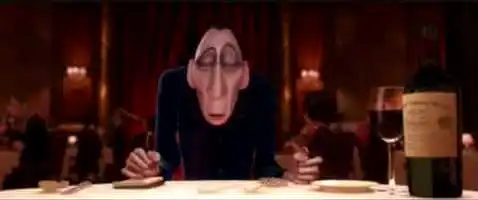A Ratatouille of the Heart Review of Ratatouille (2007), by Stefan Stenudd
Ego is the dark and devilish restaurant critic, making any kitchen staff panic, and enjoying it. He is reformed at the end of the movie, when he finally gets a taste of his dearest childhood culinary memory, though. His viciousness was the despair of never finding that joy before.
One can't be a critic without being emotionally involved in the art form examined. I wanted to be overwhelmed, and several times I was. Other times, I was fed up already after the starter actually, in a few cases I lost hope already at the amuse-bouche, the little taster that exclusive restaurants begin with as a kind of welcoming gesture. But the critic who seeks disappointment, in order to feast on vicious writing afterward, has little compassion for the art in question. Still, it's far too common. Ego (his name hardly chosen by chance) mentions it in the movie, explaining that it's a kind of writing equally enjoyed by the writers and many of their readers. But it's the easy way out and it has nothing to do with taking the job seriously. It's hardly more than a bad joke.
Secret as a SpyIn the movie, Ego is well-known and announces his arrivals to restaurants as if he were a monarch visiting his subjects. That's rarely the case among restaurant critics. I was as secret as a spy. Even at my newspaper, my identity was known only to a few. The hardest thing about the job was to guard that secret.It was necessary. You are treated so differently when the restaurant regards you as important, for one or other reason. The former New York Times restaurant critic Ruth Reichl wrote a book about her efforts to remain anonymous by putting on disguises and how much better she was treated when she did not. Here's that book on Amazon: Garlic and Sapphires. I also wrote a book about my experiences as a restaurant critic, but unfortunately it's only published in Swedish: Bong tolv år som hemlig krogrecensent. It's a fascinating job, although I wasn't always happy about it during my twelve years. The delights are many, but still in a minority compared to the disappointments. Well, after a number of dinners, you're bound to increase your demands especially when you go to restaurants that are supposed to deliver fine dining. I made sure to cover the whole spectrum, contrary to how most critics pick. Usually, they focus only on exclusive and fancy restaurants, but I also made many visits to simpler places. I even reviewed the Ikea restaurant and McDonalds. That was fun to do. These two didn't make my tongue dance, but I was often pleasantly surprised by what budget restaurants could do, in spite of their humble circumstances. What they lacked in knowledge and resources, they compensated with passion. And the finest restaurants often suffered from the opposite a lack of genuine care, with technology instead of passion as the driving force in the kitchen. That's also Ego's revelation at the end of the movie. He finds the meal emotional instead of technical, so his experience is subjective instead of objective, involved instead of distanced. That's the kind of experience a critic should always search for, and try to put into writing.
Stefan Stenudd March 2, 2011
Click here for more reviews
About CookiesMy Other WebsitesCREATION MYTHSMyths in general and myths of creation in particular.
TAOISMThe wisdom of Taoism and the Tao Te Ching, its ancient source.
LIFE ENERGYAn encyclopedia of life energy concepts around the world.
QI ENERGY EXERCISESQi (also spelled chi or ki) explained, with exercises to increase it.
I CHINGThe ancient Chinese system of divination and free online reading.
TAROTTarot card meanings in divination and a free online spread.
ASTROLOGYThe complete horoscope chart and how to read it.
MY AMAZON PAGE
MY YOUTUBE AIKIDO
MY YOUTUBE ART
MY FACEBOOK
MY INSTAGRAM
MY TWITTER
STENUDD PÅ SVENSKA
|
 Ever Young
Ever Young I can relate to that. I was a restaurant critic for twelve years, secretly tasting meals that span from orgiastic top to repulsive bottom. Nothing made me happier than finding an unexpected gem, and nothing was as disappointing as finding the dishes of a fine restaurant bland.
I can relate to that. I was a restaurant critic for twelve years, secretly tasting meals that span from orgiastic top to repulsive bottom. Nothing made me happier than finding an unexpected gem, and nothing was as disappointing as finding the dishes of a fine restaurant bland.